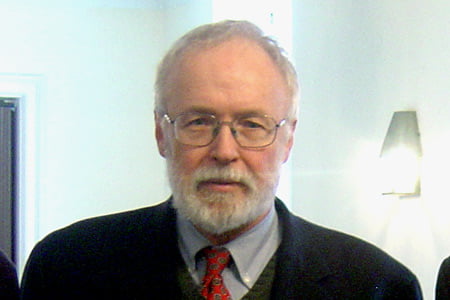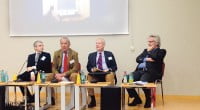The Gulen Movement: A Paradigm for the Engagement of Faith and Modernity

Date posted: February 15, 2012
In the midst of this time of crisis and opportunity, my question tonight is this: What is the future of religion in the new world order that is painfully emerging in our times? How can religion support—and constructively critique—this new international order? I personally believe, very deeply, that God is raising up leaders in every religion who point the way to a possible future for humanity, and the Gulen movement is one among many examples of how this is happening.
The Rev. Robert Corin Morris, Sept. 23, 2008*
In our era, a new world continues to take shape, a world in which religions, cultures, and different political systems, can no longer ignore each other—a world in which the desire of one to dominate the other is ultimately destructive and futile. Over the last two hundred or more years the organs of a world-wide interweaving of civilizations have been developing, and the pace of this interweaving continues to speed up. I need not outline the ways in which various movements are reacting negatively to this in ways of violence, fear and xenophobia which may tempt us to despair of the future.
In the midst of this time of crisis and opportunity, my question tonight is this: What is the future of religion in the new world order that is painfully emerging in our times? How can religion support—and constructively critique—this new international order? I personally believe, very deeply, that God is raising up leaders in every religion who point the way to a possible future for humanity, and the Gulen movement is one among many examples of how this is happening.
To understand the Gulen Movement we need to set in the wider context of the encounter of Islam with modernity. Lamentably, our education here in the West gives short shrift to Islam itself, and even moreso the many constructive responses over the past two hundred years by Muslim leaders to its new encounter with Western civilization. We hear all too much about reactionary movements and all too little about forward-looking, innovative Muslim leaders who from the early 19th century onward sought to absorb the value of Western ideas without sacrificing a deep commitment to Islam. These modernizing thinkers were often opposed by Western colonialist powers fearful of indigenous Muslim movements, thus helping create the radical and violent backlash in some Muslim countries today.
Gulen’s proclaimed ideal is to promote peaceful coexistence, and dialog of civilizations on a global scale, and to foster a cultural and spiritual renaissance in the modern Muslim world, with Turkey and its distinctive form of Sufi-influenced Islam as a leading contributor.
The movement itself is not a tight, top-down organization, but rather a large flotilla of diverse organizations from schools to discussion groups, universities and employer’s associations, charities, student bodies, radio and TV stations and newspapers and lobbying groups, and interfaith initiatives like our own New Jersey Interfaith Dialog Center.
Gulen’s vision is parallel to that of the Renaissance philosophers in the West who founded humanism, a spiritual humanism which brought European Christians out of medieval fatalism into a new era of claiming human responsibilities and power, setting them toward the Enlightenment. But Gulen laments, along with some Western thinkers from Vaslev Havel to Pope John Paul II, that our “humanism” today defines itself in opposition to the spiritual roots of the West. He represents, along with other progressive Muslims, the emergence of a new Renaissance moment in Islamic civilization. But, he wants modernization, not mere Westernization, especially not the extreme secularization of Europe
In order to realize this spiritual humanity, Gulen calls humankind to the development of classical virtues and qualities. Love is at the center: “Love is the rose in our belief, a realm of the heart that never withers…Humanism is a doctrine of love and humanity.”Inherent in love must be respect for individual conscience and this requires freedom of thought. Since freedom of thought inevitably produces pluralism, ongoing dialogue within and between cultures and traditions is crucial to produce peace-making tolerance as an essential ingredient of civilization: “Interfaith dialogue…must…(give) precedence to common points, which far outnumber polemical ones.”
There can be no true pluralism when the moral wisdom of spiritual traditions is relegated to the margins of society and not allowed to be a vigorous part of dialogue about the common good. He argues science and faith are two different aspects of the truth, but that The question is “who controls science and technology and the purpose they are made to serve….No one has suffered harm from a gun in an angel’s hand.”
For a world in crisis, and a species whose greatest challenge is the moral wisdom to handle its dangerous tools and weapons before they cause irreparable damage to us and the planet, more “Gulens” — Christian, Jewish, Muslim, or any faith — are needed. And God is raising them up.
* Rev. Robert Corin Morris is Executive Director, Interweave Center, Summit, NJ. He delivered this speech on Gulen Movement (aka Hizmet Movement) at the Interfaith Dialog Center’s (now Peace Islands Institute) Annual Dialogue and Unity Dinner in NJ on September 23, 2008.
Tags: Dialogue | Hizmet (Gulen) movement | North America | USA |
























